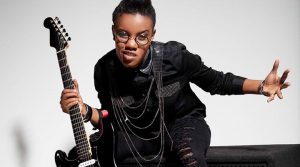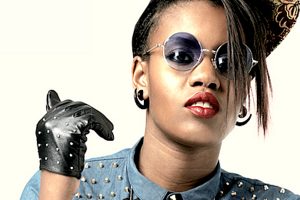‘There’s a dream, I feel, so rare, so real, all the world in union, the world as one, gathering together one mind, one heart, every creed, every color, once joined, never apart.’ These are the words from Hayley Westenra’s theme song for the rugby world cup in 2011. The words remind me of who I am as an African youth.
I was excited to interview Toya Delazy, a musician who is also working as the celebrity champion for the UNICEF Generation 2030 agenda. Her South African name is Latoya Nontokozo Buthelezi. She is from Kwa Zulu Natal in South Africa. Toya marked the highlight of the day by playing a few songs. Notably, her song ‘Khula’ which means grow reminded us that we must keep striving to be the best we can, no matter where we are.

Exciting to note is her role as the voice for the fourth Power Puff girl. Her name is Bliss. She was actually the first Power Puff girl, created by Professor Utonium. He accidentally spilled chemical W while trying to create the perfect little girl. Guess what, she can teleport across short distances. Isn’t that so cool? This was one of my favourite cartoons as a child and I was very excited to have met her. This is an excerpt from my conversation with her.
‘I started playing the piano when I was nine years old. When I went to university, I decided to do music because I loved it and I knew I could earn an income from it. My music genre is a fusion of jazz electro hip-hop. I am based in London but I travel between South Africa and London through my music. The things I talk about are basically things that I have personally experienced. I use music as a tool to heal and to encourage people. When you lose hope, you need to find a way to stand up again otherwise you won’t accomplish your destiny. Being part of the Power Puff Girls has been an exciting opportunity. Cartoon Network approached me and asked me to do a theme song for a localised version for Africa. Later on, they asked if I wanted to be the fourth Power puff Girl. I recorded my voice in London for the cartoon. It is such a high end and professional experience and I am really enjoying what I do.
When UNICEF approached my management and told me about the Generation 2030 initiative, I took it up because I like being part of projects that go hand in hand with my social message. My general stance has always been on empowerment and my work has gained purpose. This initiative will change lives because the future is in your hands,’ concludes Toya.

The Generation 2030 report on the future of African children states that by 2050, Africa will have the most children in the world. By 2050, most youth will be policy makers. How then can we empower this generation for that time to reap a demographic dividend? On the 26th of October 2017, young people across Africa gathered at the POP Art Theatre in Johannesburg, South Africa, to launch the report and present their youth statement to the world.
I have never felt prouder to be Kenyan and African like I did on that day. The youth in Africa are hopeful, they are determined but still face numerous challenges. Many of them still lack the chance to complete their education, access proper health care and even develop their talents. However, on that day, I knew that not all is lost. I hope that each of us will take time to read the report and analyse areas in which we can work on at an individual level.
Many issues arose during the press release. However, there was an emphasis on what role the media has to place in influencing young people. How can the media be used to pass more positive messages through music, films and educative programs? This came out as more of a responsibility from stakeholders in the media. They must take more action in ensuring the content they provide is of good standard.
Siatra Msandu, a youth delegate from Zimbabwe emphasized on the importance of empowering children and women. She also caught the attention of those present by emphasizing that if world leaders do not give the youth a place at the table, then we would definitely bring our own folding chairs. Joseph Ngochi from Kenya was keen to note that sometimes the issues of the boy child are left behind. Therefore, while focusing on how to empower more girls, we must ensure that they boys are not left behind. No child should be a threat to the other just because they are of the opposite gender.

CREDIT: UNICEF
Cheick Dialo from Cote d’ivoire appreciated the efforts that have already been made, he however called on world leaders to do more and close the gaps that still present. 13 year old Paulina from Mali wowed us with her message to empower children like her. She is very young, confident and already empowered at her age. How much more can we do for African children to ensure they are competing at the same level?
Lee, a girl who is studying at the Oprah Winfrey Leadership Academy was a testament to what education can do for a girl. The school, started American philanthropist Oprah Winfrey aims to empower South African girls who are needy and bright. This is just an example of how partnerships and philanthropy are key to development in Africa. I am sure we have many examples in different parts of Africa that are notably transforming lives.

Oprah and students
My call to stake holders and governments is to rise up and do more for young people. We cannot be perfect but we can do better. Africa can only grow once this generation is empowered. This is our time and we must take advantage of it.
